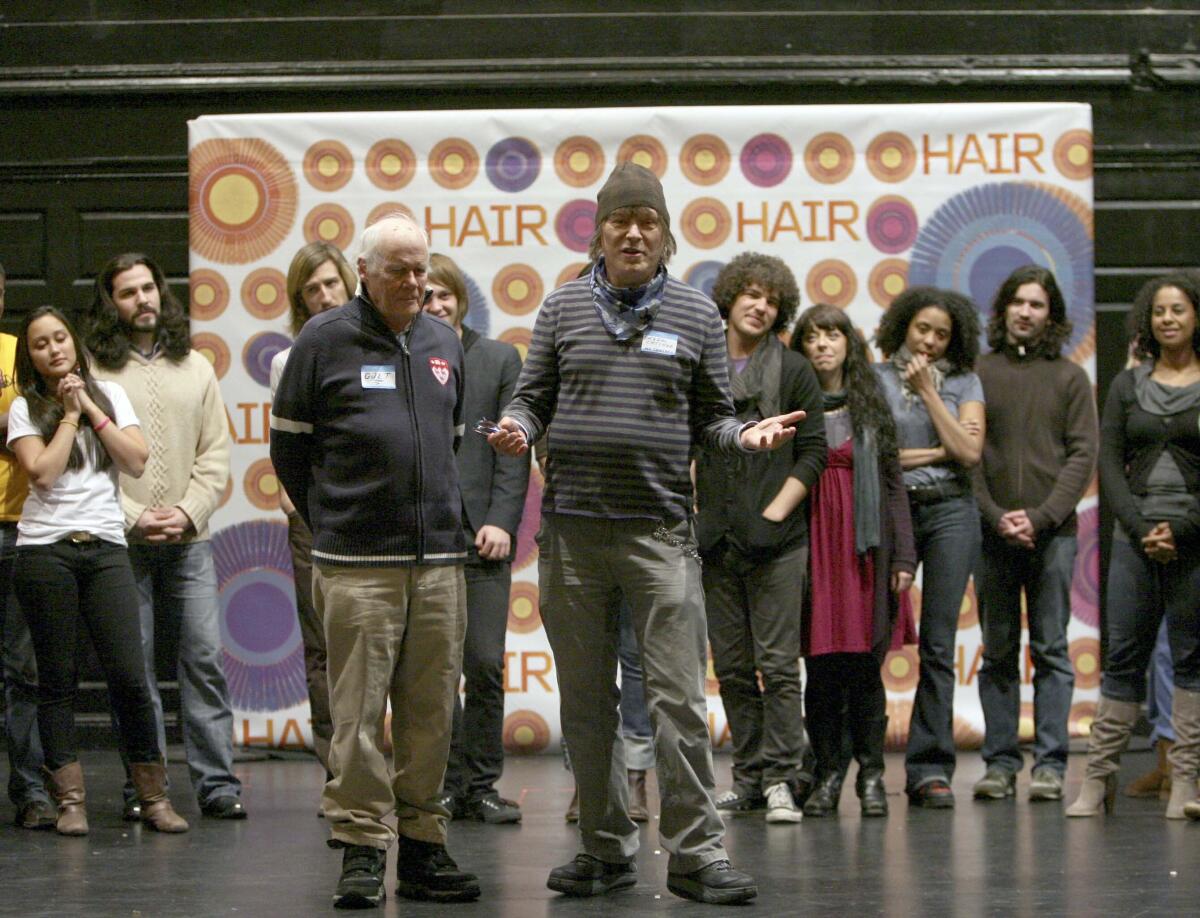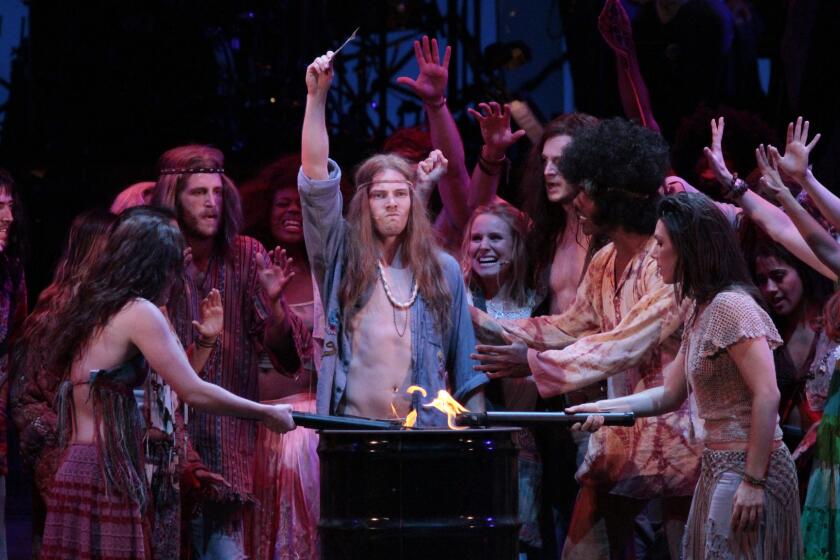James Rado, who co-created groundbreaking ‘Hair,’ dies at 90

- Share via
NEW YORK — James Rado, co-creator of the groundbreaking hippie musical “Hair,” which celebrated protest, pot and free love and paved the way for the sound of rock on Broadway, has died. He was 90.
Rado died Tuesday night in New York City of cardio respiratory arrest, according to friend and publicist Merle Frimark.
“Hair,” which has a story and lyrics by Rado and Gerome Ragni and music by Galt MacDermot, was the first rock musical on Broadway, the first Broadway show to feature full nudity and the first to feature a same-sex kiss.
“Hair” made possible other rock musicals like “Jesus Christ Superstar” and “Rent.” Like “Hamilton,” it was one of only a handful of Broadway shows in the past few decades to find its songs on the pop charts.
The so-called “American tribal love-rock musical,” had its world premiere at the Public Theater in New York City’s East Village in 1967 and transferred the following year to Broadway, where the musical ran for more than 1,800 performances. Rado played Claude, a young man about to be drafted and sent to the war in Vietnam.
Clive Barnes, theater critic for the New York Times, called the show “the first Broadway musical in some time to have the authentic voice of today rather than the day before yesterday.” The New York Post said it had “unintentional charm,” contagious high spirits and a “young zestfulness” that “make it difficult to resist.” Variety, however, called it “loony.”
The 30th anniversary revival of “Hair” at the Candlefish Theatre suffers from some weak voices and acoustical problems, but it is otherwise a rousing production that reminds us that the Age of Aquarius was more than just bad fashion, bad hair and bad drugs.
It lost the Tony in 1969 to the more traditional “1776” but won a Grammy Award. The show was revived on Broadway in 1977 and again in 2009, for which it won the best revival Tony. It was made into a movie directed by Milos Forman in 1979 starring Treat Williams and Beverly D’Angelo.
“Hair” spawned four top four singles on the American pop charts, including the No. 1 hit “Aquarius/Let the Sunshine In” by the Fifth Dimension, which won the Grammy Award for record of the year and best pop vocal performance by a group in 1970. Others included “Hair” by the Cowsills, “Good Morning, Starshine” by the singer Oliver and “Easy to Be Hard” by Three Dog Night. The cast album stayed at No. 1 on the Billboard 200 for 13 weeks.
“Hair” tells the story of best buddies Claude and Berger. Between draft-card burnings, love-ins, bad LSD trips and a parade of protest marches, the two wander through a New York filled with flower children, drugged-out hippies and outraged tourists who don’t approve of the wild goings-on. In one song, Claude poignantly sings, “Why do I live, why do I die, tell me where do I go, tell me why.”
The show is playful and chaotic, but there’s also a sense of outrage in its protests against war, racism, sexism, pollution and the general hypocrisy of an era dominated by the American involvement in Vietnam.
The kitsch factor was high, but “Hair” proved to be a congenial choice for the Hollywood Bowl, where this counterculture classic from the late 1960s breezed in for three performances this past weekend on a cloud of marijuana smoke.
“I’d still like ‘Hair’ to be about what it was about then,” Rado told the Associated Press in 1993. “‘Hair’ had a spiritual message, and it has a mystical message I hope is coming through — there’s more to life than the way it’s been devised for us, explained to us, taught to us.”
The songs of “Hair” have been used in everything from the films “Forrest Gump,” “Minions” and “The 40-Year-Old Virgin” to TV shows such as “Glee,” “So You Think You Can Dance” and “My Name Is Earl.” Billboard magazine lists “Aquarius/Let the Sunshine In” at No. 66 of its all-time top 100 songs.
In 2019, the original 1968 Broadway cast recording was inducted into the National Recording Registry of the Library of Congress. Librarian of Congress Carla Hayden deemed “these aural treasures worthy of preservation because of their cultural, historic and aesthetic importance to the nation’s recorded sound heritage.”
Rado was born in Venice, Calif., and raised in Rochester, N.Y., and Washington, D.C. After serving two years in the U.S. Navy, he moved to New York and studied acting with Paula and Lee Strasberg.
Rado was part of the ensemble of the Broadway play “Marathon ’33” in 1963 and played Richard Lionheart in “The Lion in Winter” in 1966 opposite Christopher Walken. Rado met Ragni when he was cast in the off-Broadway musical “Hang Down Your Head and Die.”
The two were interested in birthing a new kind of show and focused on the hippie scene. They wrote the script while sharing an apartment in Hoboken, N.J.. Rado originated the “Hair” role of the draftee Claude on Broadway.
“Hair” met resistance across the country. In addition to the use of four-letter words, the flouting of authority, sexual references and gross-out humor, the end of Act 1 had the entire cast strip naked to “Where Do I Go,” and there was what many believed was desecration of the American flag.
Gerome Ragni, 48, who co-wrote and starred in the Broadway musical “Hair.”
There were church groups who picketed in Evansville, Ind. Municipal officials in Chattanooga, Tenn., denied a request to stage the show, determining that it would not be “in the best interest of the community.” In Denver, police threatened to arrest anyone who appeared nude onstage. A Boston visit was challenged in court on the basis of flag desecration.
The original Public Theater production had cut the nude scene, but the creators wanted it back for the Broadway debut. Under the law at that time, New York City allowed nudity onstage onstage as long as the actors weren’t moving, which is why the whole cast of “Hair” stood together in a row, nude and perfectly still.
After “Hair,” Rado wrote the music and lyrics of the off-Broadway show “Rainbow,” co-authoring the book with his brother, Ted Rado. He later teamed up with Ragni to create the book and lyrics for the show “Sun.” Ragni died in 1991. Rado wrote a new show called “American Soldier” with his brother.
In 2009, Rado, MacDermot and Ragni were inducted into the Songwriters Hall of Fame. Marilyn McCoo and Billy Davis Jr., of the group the Fifth Dimension, were joined onstage by the Broadway cast at the time for a finale that brought the ceremony’s approximately 1,000 guests to their feet. MacDermot died in 2018.
Rado told the Hudson Reporter in 2009 that none of the show’s creators expected it to have such an enormous impact. “We thought we’d stumbled on a great idea, and something that potentially could be a hit on Broadway, never thinking of the distant future.”
He is survived by his brother Ted Rado, sister-in-law Kay Rado, nieces Melanie Khoury, Emily DiBona and Melissa Stuart, great-nieces and a great-nephew.
More to Read
Start your day right
Sign up for Essential California for the L.A. Times biggest news, features and recommendations in your inbox six days a week.
You may occasionally receive promotional content from the Los Angeles Times.







